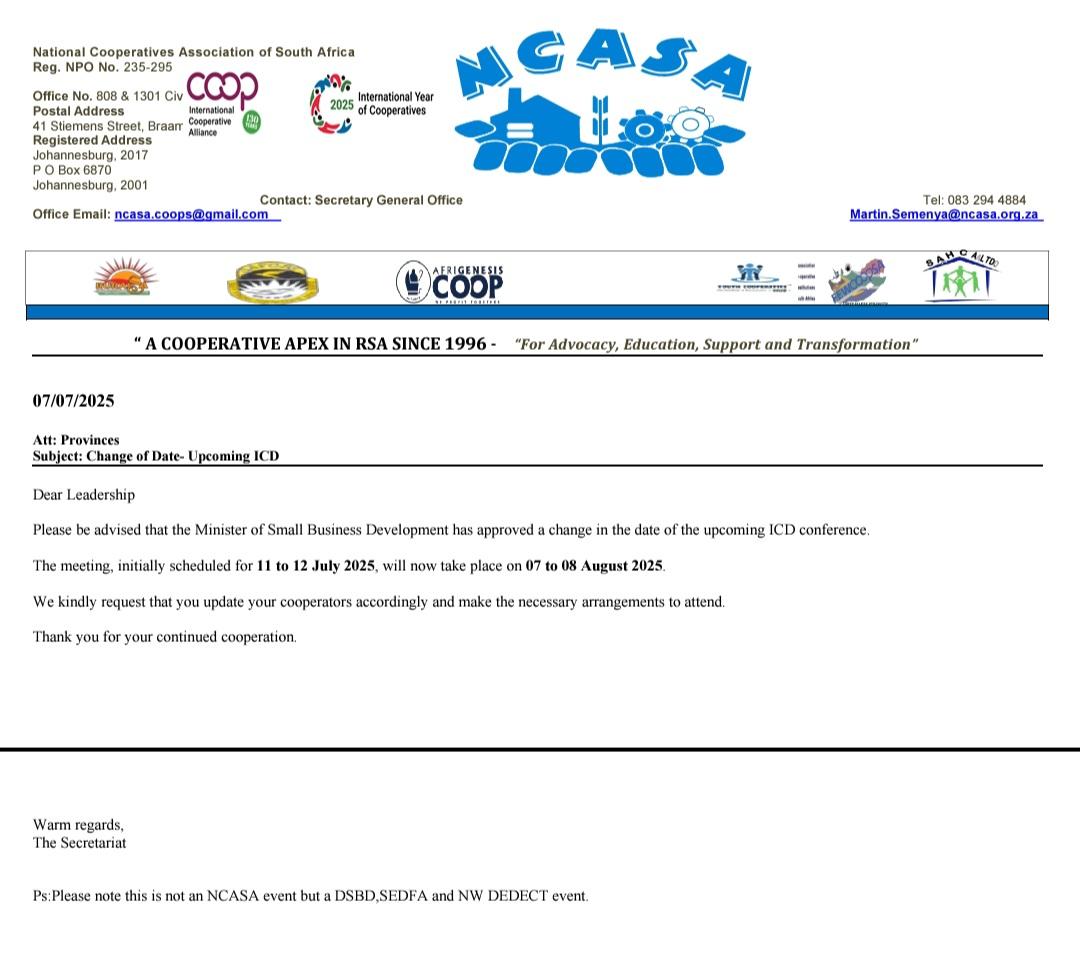ABONNEZ-VOUS POUR VOIR CECI PAGE CONTENU

Rechercher
Building Wealth in Cooperation!
-
-
We are delighted to announce the appointment of Zandile Nozinhle Matiwaza as Senior Associate at NCA AgriVest, where she will bring her wealth of experience and strategic leadership to strengthen our agricultural investment and cooperative development initiatives in South Africa and beyond.
Zandile is a seasoned executive with a proven track record across agribusiness, finance, and enterprise development. With a Bachelor of Commerce in Financial Management and progress towards her Chartered Financial Analyst designation, she combines technical expertise with visionary leadership. From her early days supplying agricultural inputs across the SADC region to governments and private stakeholders, to her executive roles shaping investment-ready supply chains, Zandile has demonstrated a deep commitment to building Africa’s food systems and strengthening rural livelihoods.
Her experience as Business Development Director at Innovatec Africa saw her nurture over 1,000 businesses from start-up to market, while her leadership as CEO of Kingdom Business Network and CFO of Goldstone & Co. positioned her at the forefront of financing and distributing agricultural products across Southern Africa. As Co-Founder and Vice President of Africa Grain and Seed, she has championed smart rural agriculture ecosystems, bringing together governments, suppliers, growers, financiers, and logistics providers to build sustainable farming models.
Zandile also holds key international roles, including Co-Chairperson of the BRICS WBA Agricultural Working Group, Advisor at Kampay, SADC Ambassador for Coding Africa, and International Relations Chairperson for the Circle of Global Business Women. Her footprint of influence spans Malawi, South Africa, South Sudan, Zambia, and Zimbabwe, where she has contributed significantly to food security, agricultural transformation, and women’s economic empowerment.
At NCA AgriVest, Zandile will play a pivotal role in driving strategic investment into cooperative agriculture, expanding market access for farmers, and building resilient value chains that align with our mission to transform rural livelihoods and strengthen South Africa’s cooperative economy. Her passion for empowering youth and women, alongside her extensive networks across Africa and global markets, will be instrumental in positioning AgriVest as a leader in sustainable agribusiness investment.
We warmly welcome Zandile to the NCA AgriVest team and look forward to the impact she will make as we continue to build a stronger, more inclusive cooperative agricultural sector for South Africa and the region.We are delighted to announce the appointment of Zandile Nozinhle Matiwaza as Senior Associate at NCA AgriVest, where she will bring her wealth of experience and strategic leadership to strengthen our agricultural investment and cooperative development initiatives in South Africa and beyond. Zandile is a seasoned executive with a proven track record across agribusiness, finance, and enterprise development. With a Bachelor of Commerce in Financial Management and progress towards her Chartered Financial Analyst designation, she combines technical expertise with visionary leadership. From her early days supplying agricultural inputs across the SADC region to governments and private stakeholders, to her executive roles shaping investment-ready supply chains, Zandile has demonstrated a deep commitment to building Africa’s food systems and strengthening rural livelihoods. Her experience as Business Development Director at Innovatec Africa saw her nurture over 1,000 businesses from start-up to market, while her leadership as CEO of Kingdom Business Network and CFO of Goldstone & Co. positioned her at the forefront of financing and distributing agricultural products across Southern Africa. As Co-Founder and Vice President of Africa Grain and Seed, she has championed smart rural agriculture ecosystems, bringing together governments, suppliers, growers, financiers, and logistics providers to build sustainable farming models. Zandile also holds key international roles, including Co-Chairperson of the BRICS WBA Agricultural Working Group, Advisor at Kampay, SADC Ambassador for Coding Africa, and International Relations Chairperson for the Circle of Global Business Women. Her footprint of influence spans Malawi, South Africa, South Sudan, Zambia, and Zimbabwe, where she has contributed significantly to food security, agricultural transformation, and women’s economic empowerment. At NCA AgriVest, Zandile will play a pivotal role in driving strategic investment into cooperative agriculture, expanding market access for farmers, and building resilient value chains that align with our mission to transform rural livelihoods and strengthen South Africa’s cooperative economy. Her passion for empowering youth and women, alongside her extensive networks across Africa and global markets, will be instrumental in positioning AgriVest as a leader in sustainable agribusiness investment. We warmly welcome Zandile to the NCA AgriVest team and look forward to the impact she will make as we continue to build a stronger, more inclusive cooperative agricultural sector for South Africa and the region.0 Commentaires 0 Parts 1KB Vue 0 AperçuConnectez-vous pour aimer, partager et commenter! -
Co-op Pay SACCO0% $0 Élevé de $1700000Co-op Pay SACCO, registered in Zimbabwe under the Co-operatives Act [Chapter 24:05] (Certificate No. 9493), is issuing 1,700,000 bearer debentures at US$1 each. These non-convertible debentures carry a 24% coupon, paid quarterly, and are redeemable after 5 years. The funds will be used to acquire a Retail Payments Systems Provider Licence from the Reserve Bank of Zimbabwe, including the US$1 million minimum capital requirement, and an Authorised Dealer in Foreign Exchange (ADLA) licence to facilitate remittances from South Africa to Zimbabwe. Proceeds will also expand Co-op Pay’s manager network across SACCOs nationwide and support transaction processing on the coops.africa Co-op Store
https://login.coops.africa/pages/payCo-op Pay SACCO, registered in Zimbabwe under the Co-operatives Act [Chapter 24:05] (Certificate No. 9493), is issuing 1,700,000 bearer debentures at US$1 each. These non-convertible debentures carry a 24% coupon, paid quarterly, and are redeemable after 5 years. The funds will be used to acquire a Retail Payments Systems Provider Licence from the Reserve Bank of Zimbabwe, including the US$1 million minimum capital requirement, and an Authorised Dealer in Foreign Exchange (ADLA) licence to facilitate remittances from South Africa to Zimbabwe. Proceeds will also expand Co-op Pay’s manager network across SACCOs nationwide and support transaction processing on the coops.africa Co-op Store https://login.coops.africa/pages/pay0 Commentaires 0 Parts 2KB Vue 0 CDE Proceeds 0 Aperçu -
The two-day symposium provided entrepreneurs with an opportunity to learn from and connect with sector practitioners and key stakeholders worldwide, while also providing strategic direction to the Cooperative Banking Institution sector and its support structures. The department coined the theme "Cooperatives Build a Better World" to accelerate service delivery to MSMEs, micro-enterprises and young, up-and-coming businesses.
Discussions centered on better understanding the dynamic nature of the sector in the South African economy, global geo-economic dynamics, and systematic obstacles to small business growth, presenting policy options to scale up support to the MSME ecosystem. The cooperatives movement aims to build on last year's foundation by advocating for a cooperative banking sector that is integral to local economic development, adaptable to new challenges and opportunities in a rapidly changing economy.
The DSBD is committed to transformation, economic inclusion, and strengthening the entrepreneurship ecosystem through partnerships with relevant stakeholders to pursue a growing, sustainable small business sector.The two-day symposium provided entrepreneurs with an opportunity to learn from and connect with sector practitioners and key stakeholders worldwide, while also providing strategic direction to the Cooperative Banking Institution sector and its support structures. The department coined the theme "Cooperatives Build a Better World" to accelerate service delivery to MSMEs, micro-enterprises and young, up-and-coming businesses. Discussions centered on better understanding the dynamic nature of the sector in the South African economy, global geo-economic dynamics, and systematic obstacles to small business growth, presenting policy options to scale up support to the MSME ecosystem. The cooperatives movement aims to build on last year's foundation by advocating for a cooperative banking sector that is integral to local economic development, adaptable to new challenges and opportunities in a rapidly changing economy. The DSBD is committed to transformation, economic inclusion, and strengthening the entrepreneurship ecosystem through partnerships with relevant stakeholders to pursue a growing, sustainable small business sector.0 Commentaires 0 Parts 659 Vue 0 Aperçu -
Deputy Minister Jane Sithole gave an overview reflecting on the state of cooperatives in South Africa.Deputy Minister Jane Sithole gave an overview reflecting on the state of cooperatives in South Africa.0 Commentaires 0 Parts 649 Vue 0 Aperçu
-
Attending the International Co-operatives Day (ICD) 2025 at Sun City Resort was truly a remarkable experience. The gathering of cooperators from across South Africa and beyond created an atmosphere of unity, innovation, and determination for the future of the cooperative movement. The discussions, presentations, and networking sessions showcased not only the achievements made so far but also the limitless potential of cooperatives in addressing social and economic challenges. Being part of this historic event gave me renewed optimism about the direction of our cooperative movement and the role we all play in shaping it.
I am deeply grateful for the opportunity to contribute to the planning and organization of ICD 2025. Working closely with the DSBD team was a privilege, and I extend my heartfelt appreciation to them for their excellent work in ensuring that every aspect of the event was well executed. Their professionalism, dedication, and collaborative spirit were instrumental in making the event a success. I also wish to thank my National Co-operative Agency team making our ICD 2025 into a memorable trip.
Looking ahead to 2026, I am filled with confidence that the cooperative movement in South Africa will continue to grow stronger. With the same collaboration between government, supporting agencies, and cooperators that we witnessed in 2025, we are well-positioned to make an even greater impact. Together, we can build on the foundation we have laid, foster deeper partnerships, and ensure that cooperatives play a central role in advancing inclusive economic development.Attending the International Co-operatives Day (ICD) 2025 at Sun City Resort was truly a remarkable experience. The gathering of cooperators from across South Africa and beyond created an atmosphere of unity, innovation, and determination for the future of the cooperative movement. The discussions, presentations, and networking sessions showcased not only the achievements made so far but also the limitless potential of cooperatives in addressing social and economic challenges. Being part of this historic event gave me renewed optimism about the direction of our cooperative movement and the role we all play in shaping it. I am deeply grateful for the opportunity to contribute to the planning and organization of ICD 2025. Working closely with the DSBD team was a privilege, and I extend my heartfelt appreciation to them for their excellent work in ensuring that every aspect of the event was well executed. Their professionalism, dedication, and collaborative spirit were instrumental in making the event a success. I also wish to thank my National Co-operative Agency team making our ICD 2025 into a memorable trip. Looking ahead to 2026, I am filled with confidence that the cooperative movement in South Africa will continue to grow stronger. With the same collaboration between government, supporting agencies, and cooperators that we witnessed in 2025, we are well-positioned to make an even greater impact. Together, we can build on the foundation we have laid, foster deeper partnerships, and ensure that cooperatives play a central role in advancing inclusive economic development.2 Commentaires 0 Parts 3KB Vue 0 Aperçu1
-
The Minister of Small Business Development in South Africa is Ms. Stella Ndabeni-Abrahams at International Co-operatives Day 2025The Minister of Small Business Development in South Africa is Ms. Stella Ndabeni-Abrahams at International Co-operatives Day 20250 Commentaires 0 Parts 492 Vue 7 0 Aperçu
-
President Bale South Africa ICD 2025President Bale South Africa ICD 20250 Commentaires 1 Parts 5KB Vue 0 Aperçu
-
National Cooperatives Association Of South AfricaAjout d'un fichier2025-07-19 14:44:19 - Traduire -General information: Stats SA publishes approximately 300 different statistical releases each year. It is not economically viable to produce them in more than one of South Africa's 12 official languages. Since the releases are used extensively locally and by international economic and social-scientific communities, Stats SA releases are published in English only. Stats SA has copyright on this publication. Users may apply the information as they wish, provided that they acknowledge Stats SA as the source of the basic data wherever they process, apply, utilise, publish or distribute the data; and also that they specify that the relevant application and analysis (where applicable) result from their own processing of the data.General information: Stats SA publishes approximately 300 different statistical releases each year. It is not economically viable to produce them in more than one of South Africa's 12 official languages. Since the releases are used extensively locally and by international economic and social-scientific communities, Stats SA releases are published in English only. Stats SA has copyright on this publication. Users may apply the information as they wish, provided that they acknowledge Stats SA as the source of the basic data wherever they process, apply, utilise, publish or distribute the data; and also that they specify that the relevant application and analysis (where applicable) result from their own processing of the data.Type de fichier: pdf0 Commentaires 0 Parts 749 Vue 0 Aperçu
-
National Cooperatives Association Of South Africaa ajouté une photo2025-07-19 14:42:27 - Traduire -The Comprehensive Agricultural Support Programme (CASP) is a South African government initiative designed to enhance agricultural development, particularly for smallholder farmers. It provides financial and technical assistance to support various aspects of agricultural production, including infrastructure, training, marketing, and access to information.
Key features of CASP include:
Target Beneficiaries:
CASP focuses on supporting smallholder farmers, land reform beneficiaries, farm workers, and small agribusinesses, including women and youth in agriculture.
Six Pillars of Support:
The program is structured around six key pillars:
On and off-farm infrastructure and production inputs: This includes support for building and improving infrastructure like irrigation systems, storage facilities, and providing essential inputs like seeds and fertilizers.
Targeted training, skills development, and capacity building: CASP provides training programs to enhance farmers' skills in areas like crop production, livestock management, and business management.
Marketing and business development: The program assists farmers in accessing markets for their produce and developing business plans to improve profitability.
Information and knowledge management: CASP provides access to relevant agricultural information and resources, including market information, best practices, and technical advice.
Technical, advisory, and regulatory services: This includes access to expert advice on various agricultural practices, as well as assistance with navigating regulations related to farming.
Financial services: CASP aims to improve access to financial resources for farmers, potentially through partnerships with financial institutions.
Promoting Sustainable Practices:
A key objective of CASP is to promote sustainable agricultural practices that ensure long-term productivity and environmental stewardship.
Improving Food Security:
By supporting increased agricultural production and efficiency, CASP contributes to improved food security for the targeted communities and the nation as a whole.
Provincial Implementation:
The program is implemented by provincial departments of agriculture, working in collaboration with various stakeholders, including the Department of Agriculture, Land Reform and Rural Development (DALRRD).The Comprehensive Agricultural Support Programme (CASP) is a South African government initiative designed to enhance agricultural development, particularly for smallholder farmers. It provides financial and technical assistance to support various aspects of agricultural production, including infrastructure, training, marketing, and access to information. Key features of CASP include: Target Beneficiaries: CASP focuses on supporting smallholder farmers, land reform beneficiaries, farm workers, and small agribusinesses, including women and youth in agriculture. Six Pillars of Support: The program is structured around six key pillars: On and off-farm infrastructure and production inputs: This includes support for building and improving infrastructure like irrigation systems, storage facilities, and providing essential inputs like seeds and fertilizers. Targeted training, skills development, and capacity building: CASP provides training programs to enhance farmers' skills in areas like crop production, livestock management, and business management. Marketing and business development: The program assists farmers in accessing markets for their produce and developing business plans to improve profitability. Information and knowledge management: CASP provides access to relevant agricultural information and resources, including market information, best practices, and technical advice. Technical, advisory, and regulatory services: This includes access to expert advice on various agricultural practices, as well as assistance with navigating regulations related to farming. Financial services: CASP aims to improve access to financial resources for farmers, potentially through partnerships with financial institutions. Promoting Sustainable Practices: A key objective of CASP is to promote sustainable agricultural practices that ensure long-term productivity and environmental stewardship. Improving Food Security: By supporting increased agricultural production and efficiency, CASP contributes to improved food security for the targeted communities and the nation as a whole. Provincial Implementation: The program is implemented by provincial departments of agriculture, working in collaboration with various stakeholders, including the Department of Agriculture, Land Reform and Rural Development (DALRRD).0 Commentaires 0 Parts 959 Vue 0 Aperçu -
National Cooperatives Association Of South AfricaAjout d'un fichier2025-07-19 14:24:46 - Traduire -The Comprehensive Agricultural Support Programme (CASP) is a South African government initiative designed to enhance agricultural development, particularly for smallholder farmers. It provides financial and technical assistance to support various aspects of agricultural production, including infrastructure, training, marketing, and access to information.
Key features of CASP include:
Target Beneficiaries:
CASP focuses on supporting smallholder farmers, land reform beneficiaries, farm workers, and small agribusinesses, including women and youth in agriculture.
Six Pillars of Support:
The program is structured around six key pillars:
On and off-farm infrastructure and production inputs: This includes support for building and improving infrastructure like irrigation systems, storage facilities, and providing essential inputs like seeds and fertilizers.
Targeted training, skills development, and capacity building: CASP provides training programs to enhance farmers' skills in areas like crop production, livestock management, and business management.
Marketing and business development: The program assists farmers in accessing markets for their produce and developing business plans to improve profitability.
Information and knowledge management: CASP provides access to relevant agricultural information and resources, including market information, best practices, and technical advice.
Technical, advisory, and regulatory services: This includes access to expert advice on various agricultural practices, as well as assistance with navigating regulations related to farming.
Financial services: CASP aims to improve access to financial resources for farmers, potentially through partnerships with financial institutions.
Promoting Sustainable Practices:
A key objective of CASP is to promote sustainable agricultural practices that ensure long-term productivity and environmental stewardship.
Improving Food Security:
By supporting increased agricultural production and efficiency, CASP contributes to improved food security for the targeted communities and the nation as a whole.
Provincial Implementation:
The program is implemented by provincial departments of agriculture, working in collaboration with various stakeholders, including the Department of Agriculture, Land Reform and Rural Development (DALRRD).The Comprehensive Agricultural Support Programme (CASP) is a South African government initiative designed to enhance agricultural development, particularly for smallholder farmers. It provides financial and technical assistance to support various aspects of agricultural production, including infrastructure, training, marketing, and access to information. Key features of CASP include: Target Beneficiaries: CASP focuses on supporting smallholder farmers, land reform beneficiaries, farm workers, and small agribusinesses, including women and youth in agriculture. Six Pillars of Support: The program is structured around six key pillars: On and off-farm infrastructure and production inputs: This includes support for building and improving infrastructure like irrigation systems, storage facilities, and providing essential inputs like seeds and fertilizers. Targeted training, skills development, and capacity building: CASP provides training programs to enhance farmers' skills in areas like crop production, livestock management, and business management. Marketing and business development: The program assists farmers in accessing markets for their produce and developing business plans to improve profitability. Information and knowledge management: CASP provides access to relevant agricultural information and resources, including market information, best practices, and technical advice. Technical, advisory, and regulatory services: This includes access to expert advice on various agricultural practices, as well as assistance with navigating regulations related to farming. Financial services: CASP aims to improve access to financial resources for farmers, potentially through partnerships with financial institutions. Promoting Sustainable Practices: A key objective of CASP is to promote sustainable agricultural practices that ensure long-term productivity and environmental stewardship. Improving Food Security: By supporting increased agricultural production and efficiency, CASP contributes to improved food security for the targeted communities and the nation as a whole. Provincial Implementation: The program is implemented by provincial departments of agriculture, working in collaboration with various stakeholders, including the Department of Agriculture, Land Reform and Rural Development (DALRRD).Type de fichier: pdf0 Commentaires 0 Parts 864 Vue 0 Aperçu -
The Zimbabwean Diaspora in South Africa has an estimated 2.5 million people. This population:
• Has little to no prospects of ever returning to their home to Zimbabwe
• Has limited access to financial services
• Has limited participation in the South African economy
uXpress SACCO Society was formed to find solutions to these and other problems facing the diaspora while creating a community that leverages its numbers to access group discounts, supplier credit and increased sales revenues.
The Zimbabwean Diaspora in South Africa has an estimated 2.5 million people. This population: • Has little to no prospects of ever returning to their home to Zimbabwe • Has limited access to financial services • Has limited participation in the South African economy uXpress SACCO Society was formed to find solutions to these and other problems facing the diaspora while creating a community that leverages its numbers to access group discounts, supplier credit and increased sales revenues.0 Commentaires 0 Parts 711 Vue 0 Aperçu
Plus de résultats
Commandité

Join eduBox Consumer Co-op for your kids freee health insurance benefits
Join the eduBox Consumer Co-op today and start saving smart! For a small monthly contribution per student, you’ll enjoy massive discounts on school supplies bought in bulk before each term...







